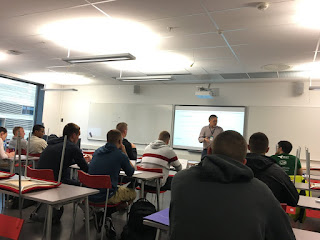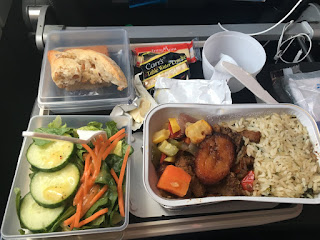Day 3
Day 3: June 26, 2019
Today the
students stayed local at the USN campus. All of the cadets quickly learned the
bus routes and they are all pros at getting from their dorms to the University.
The area the students are living is a fifteen-minute walk from the main campus,
or a five-minute bus ride (which comes every fifteen minutes) therefore, it is
important the students use their time management skills to calculate the time needed
to get to campus for 0750.
The cadets enjoy
being in class with the international students. Many students are from Norway,
however there are students from Argentina, Spain, and the Ukraine. All of the
students get along very well, and they are learning cultural differences and
asking many questions. The government and standards of living is very different
from the United States, and the students are fascinated by the cross-cultural
differences. Every now and then the local students will start speaking to each
other in Norwegian, which is very interesting to watch and listen to, however everybody
also speaks English which makes it very easy and accessible for the American students
to learn.
Throughout
the day today the students learned about the importance ports and their
functions. Most of the information was very new to the students which made the topic
very interesting to learn. A port connects eater and various land modes. The
students learned about the costs allocated to ports, the equipment needed, the infrastructure,
operations and connectivity. Fundamentals for ports was also explored
throughout the day and the lifetime of ships, and the problems many ports are
facing as ship sizes are increasing. The
students also learned about the different types of ports (Hub, Specialist, Regional/Feeder,
and Socail Infrastructure ports) and the cargo loaded in each TEU on the ship
(General, Bulk, RoRo, Passenger and Container). All of the information learned
today will be helpful for the students for the visit to Drammen Port on Friday,
June 28th.
After lunch,
another maritime specialist spoke to the group about environmental
perspectives. The students learned about low-emission technology and solutions
for ships. The speaker then opened up the floor for group discussions where
groups brought together their ideas for specific case studies regarding
low-emission technology and solutions for ships.
Next, a
speaker from Jotun spoke to the group about hull performance. The students learned
about the impact of fouling, the pathway to maximum hull performance and hull
performance solutions. The group explored hull performance market studies and
their minds were tested having to relate the data shown to ethical economic
decisions.
Finally, to
end the day a representative from DNV GL (arguably the largest classification
company in the world) spoke to the group regarding smarter use of energy on
ships. The students learned that by 2050 emissions must be reduced 50%, however
nobody knows yet how that will actually be achieved. There are different
options to obtain this goal (LNG, batteries, scrubbers etc.) and there is no
clear path, but many of opportunities. Logistics plays an essential part which
the students learned and the speed directly correlates with the economic efficiency
of the ship. The information was fantastic for the students, and this generation
of cadets will be the employees dealing with these problems in the future.





Comments
Post a Comment